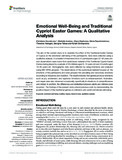| dc.description.abstract | The aim of the current study is to examine the effect of the Traditional Easter Games of Cyprus on the emotional well-being of the participants. Data were collected using a qualitative analysis. It consisted of interviews from 51 participants aged 32–93 years old, and observations were made from audiovisual material of the Traditional Cypriot Easter Games being played by a sample of 20 children aged 6–14 years old and 43 adults aged 18–65 years old. Demographic data were collected by using interviews and analyzed using IBM SPSS program. The observations of the audiovisual material focused on the emotions of the participants and were grouped into prevailing and secondary emotions according to frequency and duration. The results indicate that games produce emotions such as joy, excitement, and euphoria. Emotions such as embarrassment, frustration, and anger were also observed occasionally, specifically in situations of competitiveness and defeat. In addition, the differences and similarities between adults and children were recorded. The findings of the present study extend previous work by demonstrating the positive impact of the traditional games on children’s and adult’s emotional well-being. | en_UK |


